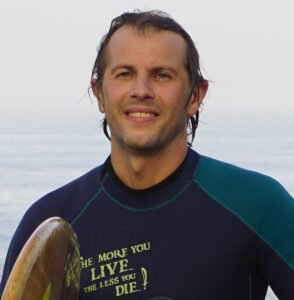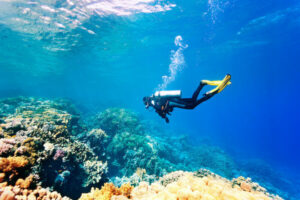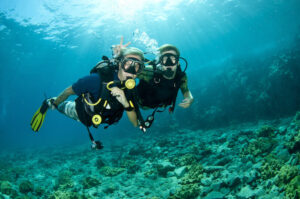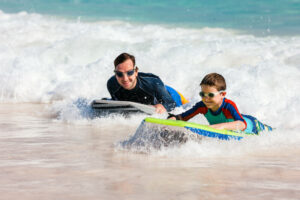Do you love scuba diving just as much as we do? Well, that is no surprise, as scuba diving is one of the most adventurous activities you can do in the water. Exploring the deep blue sea allows you to make lots of new experiences and see the world from a completely unique perspective.
However, to have the very best scuba experience, it is important to feel confident underwater. And for that, getting scuba certified is a perfect start.
In this article, you will get answers to the following questions:
- What are the requirements for getting scuba certified?
- Which gear do I need to complete the certification program?
- How long does it take to get scuba certified, and what are the costs?
- What are the best places to get scuba certified, and what should you watch out for?
What is scuba diving?
Even if you have never been scuba diving before, you probably have a pretty clear picture of a typical scuba diver in front of your eyes: a person in a neoprene suit with a big tank attached onto his back, googles strapped around the head, a mask in the mouth and fins on his feet. Yep, that is pretty much how a scuba diver look like.
But what does the word “scuba” mean in the first place? “Scuba” is actually an acronym and stands for “Self Contained Underwater Breathing Apparatus”. And that perfectly describes its function, as a scuba is nothing more than a tank filled with oxygen that allows you to breathe underwater.
Without a scuba, you would most likely not be able to explore the world’s most beautiful coral reefs and swim amongst the most colorful fish.
But before you get the full scuba diving equipment and head out to the sea, it is good to learn how to use that equipment properly. And the best way to do you is by getting a scuba certification. Let’s look at how to get scuba certified in a few simple steps.
Physical Requirements
Let’s be clear on one thing: you do need to know how to swim in order to get scuba certified. But that doesn’t mean that you have to be an Olympic swimmer to pass your scuba certification.
For certifications like the “PADI Open Water Diver” you need to show that you are capable of swimming 200 meters without a break. You can do so in any desired stroke. Also, you need to be able to float above the water for 10 minutes straight.
Next to proving your swimming skills, you are required to fill out a medical form and disclose any previous medical conditions that might bear a risk when diving in the sea.
In case you do have existing underlying health issues, that doesn’t mean you can’t get scuba certified, but you do need to consult a doctor to assess any potential risks.
At the same time, there are certain medical conditions that do permanently disqualify you from getting your scuba certification. These include strokes, brain aneurysm or lung collapse to name a few. Health conditions that may temporarily hinder you from scuba diving are pregnancy or epilepsy.
Here is an overview of the physical requirements:
- be able to swim 200 meters in any stroke
- be able to float and tread water for 10 minutes
- disclose pre-existing medical history
General Requirements to start scuba lessons
Next to demonstrating certain swimming abilities and completing a medical questionnaire that shows you are in sufficient physical condition to dive, you must have reached a certain age to start your scuba lessons.
Most scuba diving organizations only offer lessons for people above the age of 10. In some cases, you find programs for kids under the age of 10, but these are often limited regarding the depth of and duration in the water.
Kids aged between 10–14 years can get certified by the “PADI Junior Open Water Divers”. In this program, youngsters dive as a deep as maximum 60 feet (~18 m) and only as long as a certified parent or guardian is present.
From age 15 and onwards, the depth and duration restrictions don’t apply any longer. Teens then have the option to advance to the “Open Water Divers” card.
Here is an overview of the different diver levels:
- Junior Open Water Divers: 10–11 years – 40 feet (~12 m) and must be accompanied by an instructor or certified parent/guardian
- 12–14 years – 60 feet (~18 m) and must be accompanied by a certified parent/guardian
- Recreational Divers/Open Water Divers: 60 feet (~18 m)
- Advanced Open Water Divers: 100 feet (~30 m)
- Deep Divers: 130 feet (~40 m)
- Technical Divers: 130 feet + (40 m+)
Which gear do I need?
Gear is key when it comes to scuba diving. So, make sure you get the perfect fit before heading out into the waters.
If you plan on getting scuba certified, you will find that most organizations provide the essential equipment required. This usually includes the air tank, fins, and regulators. What any scuba diver, no matter which skill level, should invest in is a proper scuba mask. Make sure to grab goggles that are snug to prevent them from getting foggy.
If you want to take it one step further, you can also invest in a wetsuit upfront. Although most organizations provide them for you, it can be quite a challenge finding the right size sometimes. So, to make sure you don’t end up freezing, think about getting your very own wetsuit.
More advanced scuba divers can also consider getting a dive computer to keep track of diving depth and time in the water. Having your own personal dive computer allows you to improve your dive and often also adds some additional peace of mind.
How long to get scuba certified?
If you are planning to enter a scuba certification program, you will probably wonder how long it will take to finish it. After all, you want to get started exploring the deep blue as soon as possible, right?
And don’t worry, you won’t be spending days and nights in the “scuba school” learning the basics of scuba diving. Although most programs are performance based, you will usually be good to go within 3 to 4 days.
As most certification programs, the scuba certification process consists of both a theoretical and a practical part. For the theoretical part you can go for an e-learning option, for example the PADI e-learning. Depending on your personal learning speed, you will be able to finish this part within a day. For that, you can hop onto the PADI e-learning app, which is very user-friendly and easy to deal with even for non-tech-savvy people.
Once you have successfully finished the theory part of your program, it is time to move to the fun part: the practice. In this part, you will take your first steps in becoming a certified scuba diver.
Most organizations take their scholars to a pool or pool like water conditions that allow to practice in a safe environment. Over the course of two days you will learn how to set up your scuba gear and service it, how to properly breathe underwater, and practice your diving skills.
Learning all those different skills both in theory and practice is great. You will not only finish your program as a certified scuba diver but even more important you will gain some major confidence to explore the deepest of seas.
All in one, getting scuba certified really depends on your individual progress. If you are a quick learner and more than eager to complete the program, you can get your scuba certification within three days. But hey, there’s really no need to rush. Enjoy the process!
How much to get scuba certified – The costs
Getting scuba certified definitely comes at a price, but this is not as high as you might think. Again, there is no single price tag attached to scuba certification programs, as prices depend on several factors. For orientation, you can roughly calculate with anything between $300-$600.
One key factor that can greatly influence how much it costs to get scuba certified is the location of the program. Typically, organizations in the US or UK offer programs at a higher rate than organizations located in Indonesia or Thailand, where the costs of living are generally much lower.
Most scuba centers will provide you with the equipment needed to take the course without charging additional fees. However, some schools may ask you to bring your own mask, snorkel, and fins. So, you might want to consider buying those upfront, as you will most likely need them anyway once you have completed the course.
When choosing your organization, it is worth not only looking at the price, but also going for a reputable scuba center. Try to make sure that the program you pick meets the quality standards from certification agencies such as PADI, NAUI, or SSI.
How to get PADI certified
The “PADI Open Water Diver” is the first level of your scuba certification and a great way to start off your scuba journey. In this program, you will have a certified PADI instructor who will teach you everything you need to know about scuba diving in a calm and professional manner to ensure you feel 100 % safe when heading out to the waters.
The PADI certification is the world’s most recognized scuba certification. This means you will learn from the best and can be sure to be fully prepared for your deep-sea explorations.
In order to receive your PADI certification, you will start off on the e-learning platform, where you will learn about the principles of scuba diving and the most important terminology. This part usually takes between 5–10 hours, depending on your individual speed.
Once you have completed the PADI e-learning, it is time to jump into the water. In this second part of the course, you will complete several “mini dives” in a pool or pool-like environment to help you get that confidence. In order to get PADI certified, you have to be at least 10 years old, able to swim, and medically fit.
Conclusion: How to get scuba certified
Scuba diving can be a truly life-changing experience. It allows you to explore the underwater world and see the most mesmerizing sea-life. And in order to make the very most out of your scuba experience, it is significant to be prepared sufficiently. For that, getting scuba certified is definitely the right way to start.
By getting scuba certified, you will not only learn the technicalities of scuba diving, but will also get enough practice in a safe environment before heading out to the deep blue. This allows you to gain the confidence to independently explore the sea later on.
If you plan to get your scuba certification, look out for reliable and recognized organizations that meet the quality standards. Providers like PADI will ensure that you are trained by experts and gain the knowledge needed.
Investing in a scuba certification is worth every penny. It is a valuable process during which you will probably get even more excited to start going. Enjoy the dive!
FAQ – Most asked questions about how to get scuba certified
The costs of a scuba certification depend on factors like location and platform. In the US or the UK, prices range anywhere between $450 and $600. In countries like Indonesia or Thailand, you can get PADI or SSI certified for around $300. Online courses like the PADI e-learning program already start at round $150.
No, scuba certifications do not run out, they last for a lifetime. However, it is recommended to take a refresher course after having had a longer break from scuba diving. This will get you kick-started right away.
Getting scuba certified really doesn’t take that long. Although completion depends on your very own pace, the average time it takes to complete both the theoretical and practical part is about 3–5 days.
Kids above age 8 can already take their first small steps in their scuba journey by diving with an instructor, but without getting certified. Getting scuba certified requires a minimum age of 10 years.
You can get scuba certified from almost every place of the world. Many organizations like PADI, NAUI, SSI, or CMAS offer online classes which allow you to complete the theoretical part. Once you have completed that, it is time to find the right place to start practicing. Here, too, the options are nearly endless.









